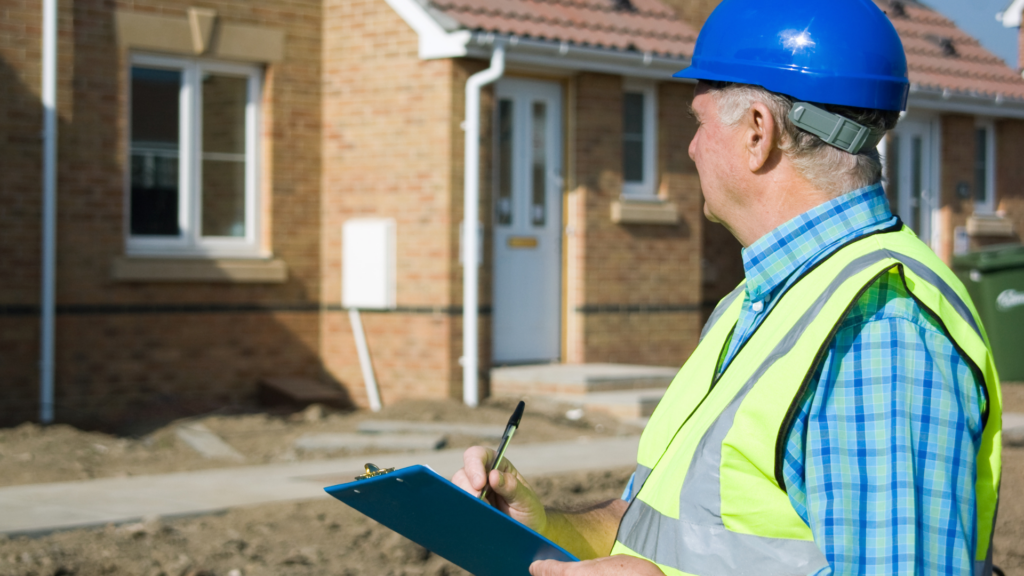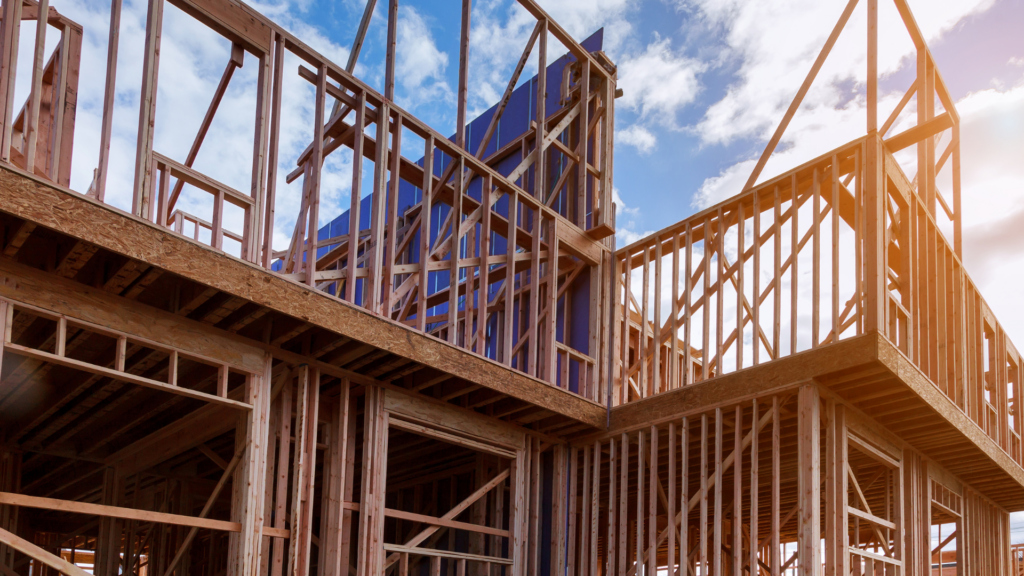- What Does Buying Off Plan Actually Mean?
- Why Buy an Off-Plan Property in the UK?
- What Are the Pitfalls When You Buy Houses Off Plan?
- Can You Get a Mortgage to Buy an Off-Plan Property?
- How Does the Buying Off-Plan Process Work?
- What About the Off-Plan Deposit and Stamp Duty?
- Key Takeaways
- The Bottom Line: Are Off-Plan Properties Worth the Gamble?
What You Must Know Before You Buy Off Plan Properties
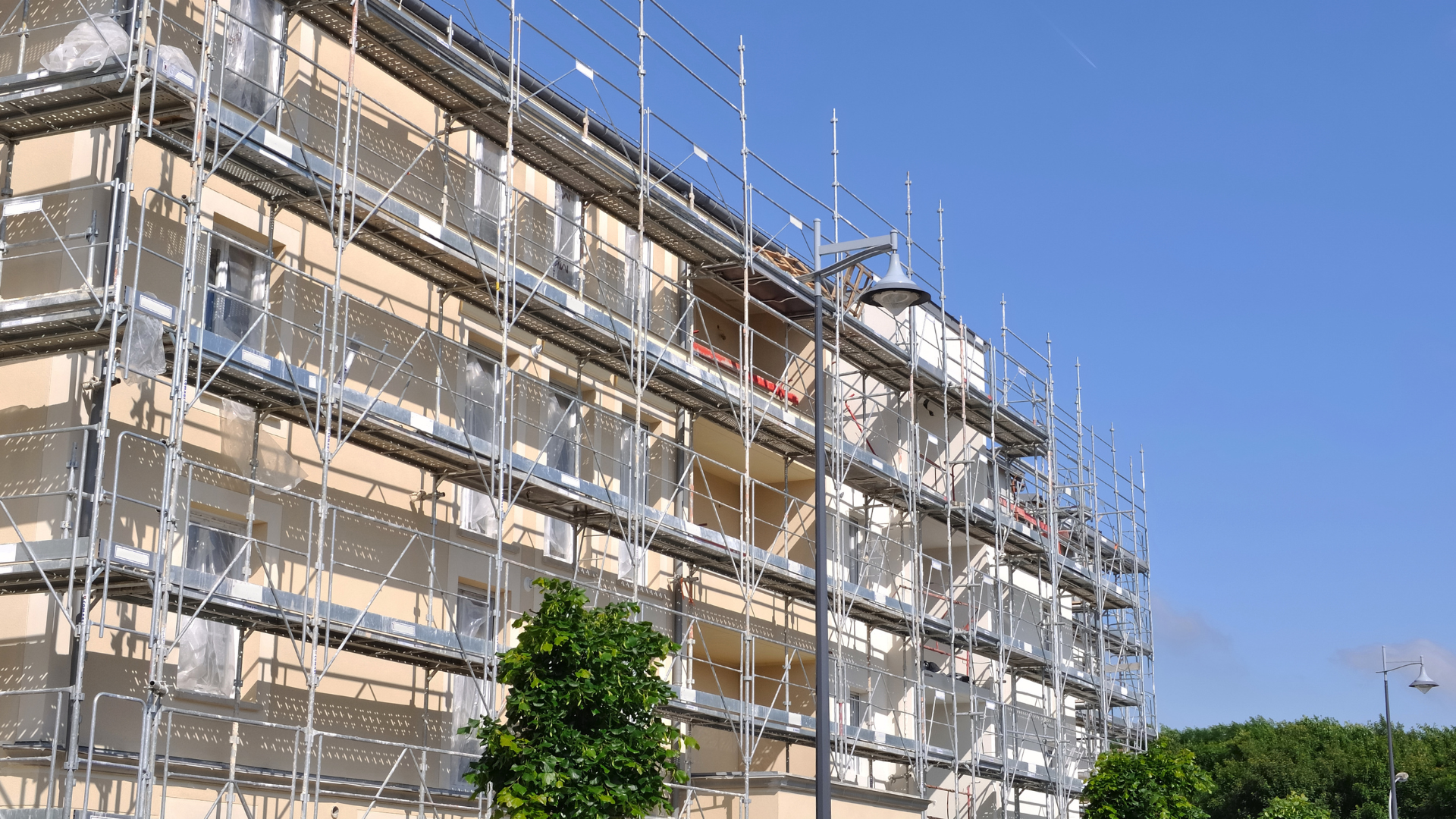
Imagine choosing your new home before the first brick is even laid.
That’s the beauty of buying off-plan—you get first dibs on everything, from the layout to the finishes.
It’s like designing your own space without the hassle of renovations.
But before you start picking out the perfect kitchen tiles, let’s make sure you’ve got your mortgage sorted, so the process goes smoothly from start to finish.
This guide covers buying off-plan properties in the UK, the pros and cons, how it works, and how to get the best mortgage to finance your purchase.
What Does Buying Off Plan Actually Mean?
Buying off plan means buying a property before it’s built or while it’s still being constructed. You’re buying a promise, based on plans and an idea of what your future home will be.
The developer will show you floor plans and brochures, but you won’t see the finished home until much later.
The good news is that buying off plans lets you add personal touches.
You could choose the kitchen fittings or even decide where the walls go, making it feel more like your own.
However, you are buying something that isn’t finished, so there’s always a bit of unpredictability.
Let’s look at what else you need to know before buying off plan.
Why Buy an Off-Plan Property in the UK?
So, why would anyone go for buying a new build off plan? Here are a few reasons why it could be a fantastic choice:
First, you get a brand-new home. No creaky floors, no outdated bathrooms, no peeling wallpaper.
Everything is shiny and new, and better yet, you can often have a say in how it looks.
You can choose your finishes and make some tweaks, which means fewer “Oh, I wish this was different” moments once you move in.
Second, you could get in early and secure a good price.
Property values tend to rise over time (fingers crossed for a favourable market), so by the time your new build is ready, it might be worth more than you paid for it.
That’s what we call a win-win—happy days!
And lastly, there’s no property chain above you.
You’re not waiting for someone else to decide if they want to sell their house, and you don’t have to deal with that frustrating uncertainty of whether they’ll actually go through with the sale.
But wait—there are also a few challenges to keep in mind.
What Are the Pitfalls When You Buy Houses Off Plan?
Buying off plan has its perks, but like anything in life, there’s another side of the coin.
Here’s what you need to look out for when considering an off-plan property in the UK:
Delays
If your new build gets delayed (which can and does happen), then you might be left in a bit of a pickle. Your mortgage offer might run out before the property is ready.
Imagine all set to move in, only for the building work to drag on—not so fun.
And not all mortgage lenders are super keen on off-plan properties, meaning fewer choices for you.
Fewer mortgage options
Some lenders will only lend once the property is complete, while others might give you an offer upfront but with conditions that may not fit your ideal picture.
You may also need to reapply if delays push beyond the validity of your mortgage offer—tricky!
The Unknown Factor
Another thing to consider: buying off plan comes with risks because the house isn’t there to see.
You can look at drawings and virtual tours all you like, but there’s still an element of surprise when you finally get the keys and walk through that door.
Will it feel right? Will the rooms be the size you pictured? Not knowing for sure can be a little unnerving.
Can You Get a Mortgage to Buy an Off-Plan Property?
Yes, you can get a mortgage to buy an off-plan property, but it can be a bit more complicated than with a finished home.
Lenders can be cautious because the home isn’t built yet. They want to be sure things go smoothly and the property will hold its value when complete.
Lenders look at a few key things when deciding to lend for an off-plan property:
- Your Financial Situation. Lenders want to see that you have a steady income, good credit history, and manageable debts. The more stable you are, the more likely they are to approve your mortgage.
- The Developer’s Reputation. Lenders prefer developers with a good track record. If the developer has completed similar projects on time and to a high standard, it will be easier for you to get a mortgage.
- Completion Timeline. Delays are a big risk with buying off plan. Mortgage offers usually last for 6 months, and if the build takes longer, your offer could expire. Some lenders have special deals with longer offer periods, but you might need to reapply if there are delays.
- Property Valuation. Lenders will do a valuation when you apply and again when the property is nearly done. They need to be sure the property is worth what you are borrowing.
Using a mortgage broker can really help when buying off plan. They know which lenders are more flexible with off-plan properties and can help you find the best deal.
If there are delays, a broker can also help you extend your offer or find a new one without too much hassle.

How Does the Buying Off-Plan Process Work?
If you decide to buy property off plan, it can seem a bit different from a traditional home purchase.
But don’t worry, here’s a step-by-step guide to get you on the right track.
Step 1: Sort Out Your Finances
First things first, you need to know how much you can borrow. Lenders can be a bit fussy when it comes to off-plan new builds, so having a good chat with a mortgage broker can make all the difference.
They’ll help you figure out what you can afford and who’ll give you the best deal. It’s key to have your off-plan mortgage options sorted early so you’re not left hanging if delays happen.
For a quick tailored estimate, use our mortgage calculator. This will tell you how much you can borrow based on your income.
Step 2: Choose Your Dream Home
This is the exciting part—finding your dream home.
With off-plan purchases, you’ll be choosing from plans, showrooms, or even visiting a similar property by the same developer.
Do your research on the developer too.
You’ll want to know that they’re reliable, and other buyers have had a good experience. If they’ve got a history of long delays, it’s worth thinking twice.
Step 3: Get Your Mortgage in Principle
Once you’ve figured out which property you want, it’s time to get a mortgage in principle.
This tells the developer that a lender is likely to approve your mortgage, so it shows you’re serious. Developers tend to prefer buyers who are ready to commit, and this document is part of that.
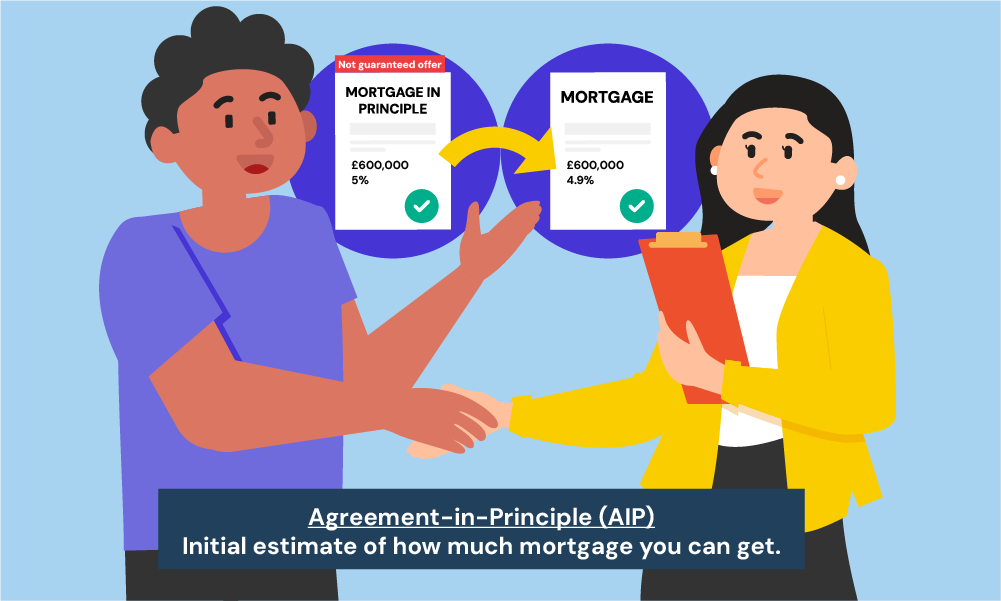
Step 4: Negotiate and Reserve
Just because you’re buying off plan doesn’t mean the price is set in stone. Have a go at negotiating, you’d be surprised.
Once you agree, you’ll need to pay a reservation fee—usually between £500 and £2,000—which secures your spot.
This fee often goes towards your deposit when you exchange contracts.
Step 5: Time to Apply for the Mortgage
With the reservation sorted, it’s time to officially apply for your mortgage.
Don’t waste time here; developers generally only give you 28 days to exchange contracts once you reserve.
The quicker you sort out your finances, the quicker you’ll be ready to make it official.
Step 6: Exchange Contracts
This is where it all starts to get real. You’ll exchange contracts and pay your deposit—typically around 10%.
From this point, you’re legally committed to buying the property. If anything changes, like a drop in the property’s value or the developer going bust, make sure your solicitor has included a long-stop date to protect you.
This gives you an exit strategy if construction is severely delayed.
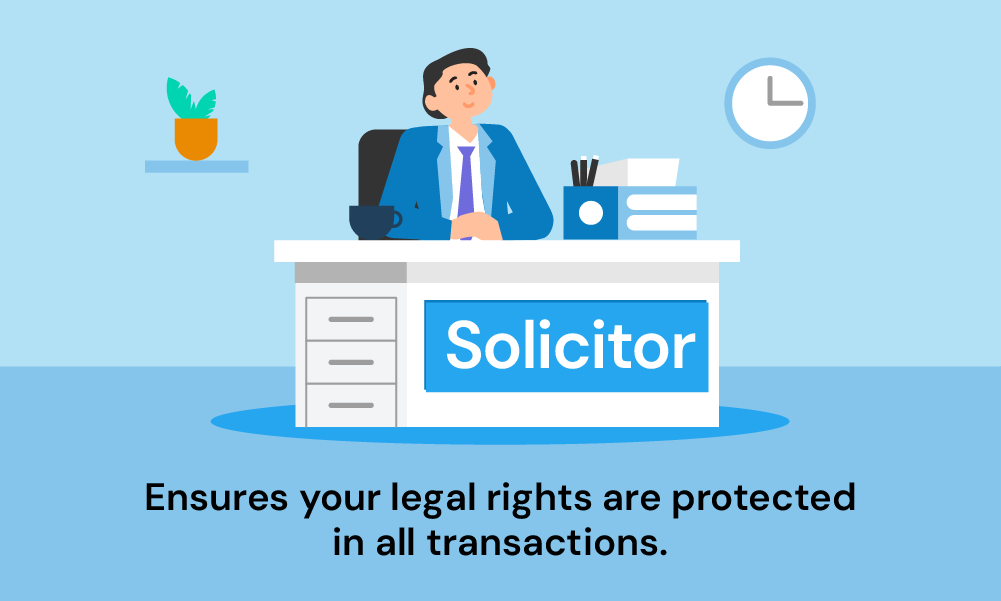
Step 7: Pre-Completion Inspection
As your new build nears completion, you’ll want to do a pre-completion inspection (or snagging).
This involves looking out for any defects or issues that need to be sorted before you move in—things like paintwork, tiles, or any other bits that aren’t quite up to scratch.
Better to get it sorted while the builder’s still around, rather than later.
Step 8: Moving In
Finally, you’ll receive a ‘notice to complete’ from the developer, giving you around 10 days to finish everything up and officially move in.
Once you complete, you get the keys, and it’s all yours—a big congrats moment! 🎉
What About the Off-Plan Deposit and Stamp Duty?
When you’re buying a house off plan, the deposit usually sits around the 10% mark, payable when you exchange contracts.
Keep in mind that this is a BIG commitment—once you exchange, you’re legally tied in.
If, for any reason, you’re unable to complete (like if your mortgage falls through or construction drags on), you could lose that deposit.
Stamp duty is another thing you’ll need to factor in. It’s based on the agreed price at the time you reserved the property, so it’s best to know what you’re up for before you even sign on the dotted line.
To avoid any surprises, use our Stamp Duty Calculator to get an estimate of how much you’ll need to budget for—it’s quick, easy, and could save you from unexpected costs later.
Key Takeaways
- Buying off plan means committing to buy a property before it’s finished, sometimes even before it’s started.
- There are several pros—like the potential for property value appreciation, the chance to have your say on finishes, and the absence of a property chain.
- Challenges include delays in construction, the risk of mortgages expiring, and the unpredictability of what you’ll get in the end.
- Always do your research on the developer, get your finances sorted early, and make sure your solicitor adds a long-stop completion date to your contract to protect yourself.
The Bottom Line: Are Off-Plan Properties Worth the Gamble?
Buying off-plan isn’t for everyone. But if you like new things, want to have a say in how your home looks, and are comfortable with a bit of uncertainty, it can be a great option.
The flexibility to customise, the lack of a property chain, and the chance that the value could rise by the time you move in are all very appealing factors.
However, it’s important to understand the risks too.
There’s uncertainty about completion dates, potential mortgage challenges, and the fact that you can’t walk through the front door until it’s all finished.
To make the process easier, consider using a qualified mortgage broker. Here’s how they can help you:
- Find the right mortgage deals for off-plan purchases
- Negotiate to lenders for an mortgage extension if there are construction delays
- Ensure you’ll get the best rates and terms for your budget
- Save you time, money, and the hassle of searching the entire mortgage market.
- Handle the paperwork and guide you through the process.
Want to get started? Reach out to us. We’ll connect you with a good mortgage broker who can help your off-plan purchase smoother and less stressful.
Get Matched With Your Dream Mortgage Advisor...

Frequently asked questions
Is buying off plan a good investment?
It can be. If property values rise between the time you reserve and move in, you could end up with a home worth more than you paid. However, there’s always a risk that delays or market changes might complicate things.
What if the developer goes bust?
Make sure your deposit is protected, and your solicitor should cover what happens in this situation—it’s crucial to work with a solicitor experienced in off-plan properties.
Will my off-plan property be exactly like the plans?
Not always. Developers make every effort to stick to plans, but things can change. It’s best to expect some minor differences so you aren’t disappointed when you finally move in.


